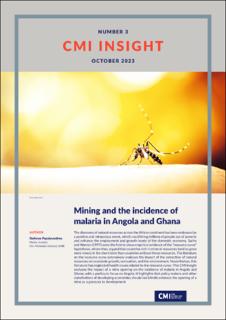| dc.contributor.author | Papalysandrou, Stefanos | |
| dc.date.accessioned | 2023-10-24T16:37:09Z | |
| dc.date.available | 2023-10-24T16:37:09Z | |
| dc.date.issued | 2023-10-01 | |
| dc.identifier | oai:www.cmi.no:8965 | |
| dc.identifier.citation | Bergen: Chr. Michelsen Institute (CMI Insight 2023:3) 7 p. | |
| dc.identifier.issn | 2535-3446 | |
| dc.identifier.uri | https://hdl.handle.net/11250/3098517 | |
| dc.description.abstract | The discovery of natural resources across the African continent has been embraced as a positive and miraculous event, which could bring millions of people out of poverty and enhance the employment and growth levels of the domestic economy. Sachs and Warner (1997) were the first to show empirical evidence of the “resource curse” hypothesis, where they argued that countries rich in mineral resources tend to grow more slowly in the short term than countries without these resources. The literature on the resource curse extensively analyses the impact of the extraction of natural resources on economic growth, corruption, and the environment. Nevertheless, this literature has neglected health issues related to the resource curse. This CMI insight analyses the impact of a mine opening on the incidence of malaria in Angola and Ghana, with a particular focus on Angola. It highlights that policy makers and other stakeholders of developing economies should not blindly embrace the opening of a mine as a panacea to development. | |
| dc.language.iso | eng | |
| dc.publisher | Chr. Michelsen Institute | |
| dc.relation | CMI Insight | |
| dc.relation | 2023:3 | |
| dc.relation.ispartof | CMI Insight | |
| dc.relation.ispartofseries | CMI Insight 2023:3 | |
| dc.relation.uri | https://www.cmi.no/publications/8965-mining-and-the-incidence-of-malaria-in-angola-and-ghana | |
| dc.subject | Mining | |
| dc.subject | Malaria | |
| dc.subject | Employment | |
| dc.subject | Growth | |
| dc.subject | Natural Resources | |
| dc.subject | Health | |
| dc.subject | Ghana | |
| dc.subject | Angola | |
| dc.subject | Africa | |
| dc.title | Mining and the Incidence of Malaria in Angola and Ghana | |
| dc.type | Report | |
